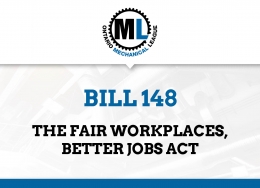Bill 148 and Electrical Contractors: FAQ’s and Answers
February 7, 2018

Bill 148, the Fair Workplaces, Better Jobs Act, 2017, introduces significant amendments to Ontario’s Employment Standards Act (“ESA”) and Labour Relations Act (“LRA”), and limited amendments to the Occupational Health and Safety Act. Most of the amendments came into force on January 1, 2018.
There are many components to Bill 148 that will, or have the potential to, significantly impact OEL members.
Sherrard Kuzz LLP has been providing updates on Bill 148 to the OEL and its members since this legislation was first introduced in June 2017. Now that it is enacted, and many provisions are in force, OEL members have raised questions about how some of these provisions will impact electrical contractors and the construction industry generally.
This purpose of this article is to address the “Top 5” Bill 148 questions from OEL members and provide general guidance on how the specific provisions of Bill 148 will apply to electrical contractors. For specific advice related to your workplace, contact Sherrard Kuzz LLP.
BILL 148: “TOP 5” QUESTIONS FROM OEL MEMBERS
Q1: Can We Pay Public Holiday Pay and Personal Emergency Leave Pay as a Percentage of an Employee’s Wage?
Yes. Recent regulations adopted make significant amendments to the entitlement to personal emergency leave (“PEL”), vacation pay and public holiday pay for construction employees. These amendments will allow an OEL contractor to comply with the new public holiday pay and PEL pay requirements through a percentage top-up on an employee’s regular wages.
A construction employee working in the construction industry will be exempt from the public holiday provisions of the ESA where the employee receives:
• At least 7.7% of his or her hourly wage for vacation pay or holiday pay, if the employee’s period of employment is less than five years.
• At least 9.7% of his or her hourly wage for vacation pay or holiday pay, if the employee’s period of employment is five years or more.
In addition, a construction employee working in the construction industry who receives at least 0.8% of his or her hourly wage for personal emergency pay will not be entitled to receive two paid PEL days. However, the employee will continue to be entitled to receive ten (10) unpaid PEL days.
Although Bill 148 permits an employer to require an employee who takes a PEL day provide evidence to verify eligibility for the leave, it expressly prohibits an employer from requiring the employee provide a medical note to substantiate the need for a PEL day.
Q2: Our Electricians Are Often “On Call.” Will They Need to Be Paid for “On Call” Work Even If Not Called Out to a Job?
Yes. An electrician will need to be paid for at least three hours of work, even if he or she is not called out to a job.
Bill 148 introduces a number of provisions to regulate the scheduling of work and minimum pay required where a shift is cancelled or cut short. If an employee is “on call” and not called in to work, or is called in for work for fewer than three hours despite being available to work longer, the employee will be entitled to three hours of pay at his or her regular rate of pay, or the amount the employee earned for the time worked plus the wages equal to his or her regular rate for the remainder of the three hours (whichever is greater). This only applies to the first “on-call” shift in any 24-hour period.
An employee will likely be considered to be “on call” where the employee is required to be accessible by pager, phone or e-mail to respond to a call to perform work.
These scheduling requirements take effect January 1, 2019. For a unionized contractor, Bill 148 temporarily “grandfathers” scheduling provisions contained in any collective agreement in effect as of January 1, 2019 up to the earlier of January 1, 2020 or the expiry of the collective agreement. Any new collective agreement made or renewed after January 1, 2019, must comply with the scheduling requirements.
Q3: Does an Increased Minimum Wage Mean We Must Increase our Journeyperson Rate?
No. Effective January 1, 2018 the general minimum wage increased to $14.00 per hour. It will increase to $15.00 per hour on January 1, 2019. The minimum wage increase may impact the amount an apprentice will be paid, if he or she was previously paid less than $14.00 per hour. However, Bill 148 does not entitle a journeyperson already making more than $14.00 per hour to any proportional wage increase.
Many OEL contractors have training agreements, through the Ministry of Advanced Education and Skills Development, to provide on-the-job training and valuable work experience to apprentices. Under a training agreement, an apprentice is entitled to be paid a wage rate that is based on a minimum percentage of the applicable journeyperson rate. The Ministry’s training agreement does not require the differential between an apprentice and a journeyperson remain static. This means an apprentice may be paid more than the percentage rate, but not less.
For example, if a journeyperson made $32.50 per hour and an apprentice made $13.00 per hour (being 40% of the journeyperson rate), when the apprentice rate increased to $14.00 the apprentice now makes 43% of the journeyperson rate. However, this does not violate the training agreement, as it does not require the apprentice rate be exactly 40% of the journeyperson rate – it only requires the apprentice receive at least 40% of the applicable rate.
Q4: Do the Expanded Successorship Provisions under the LRA Apply to OEL Contractors Performing Service Work?
No. These provisions will not apply to OEL contractors performing construction or maintenance services. Under Bill 148, where a contract for building services comes to an end and a new provider contracts to provide those services, that change in service provider is deemed to be a “sale of a business.” In other words, if a service provider is bound by a collective agreement and loses the contract with the building to a new service provider, that new service provider becomes bound by that collective agreement and any outstanding obligations incurred but not satisfied by the previous service provider.
This section applies only to building service providers who provide services “directly or indirectly by or to a building owner or manager that are related to servicing the premises, including building cleaning services, food services and security services.” Bill 148 expressly provides this section does not apply to construction or maintenance services.
Q5: Do the Employee List Provisions of the LRA Apply to OEL Contractors?
Possibly, but generally, no. Where an OEL contractor falls within the definition of an “employer” under Section 126 of the LRA (discussed below), the employee list provisions will not apply. Section 126 of the LRA relates to the construction industry.
Under Bill 148, a union is able to apply to the Labour Board for access to a list of employees in a proposed bargaining unit for the purpose of organizing the workplace. This is one of the most controversial amendments to the LRA. A union may obtain the list where the Board is satisfied the union appears to have membership support from at least 20% of the proposed bargaining unit (usually shown by submission of signed union cards). The employee list the employer is to provide, if ordered to do so by the Board, is to contain each employee’s name, phone number and personal email address (if the employer has this information). If the Board finds it equitable to do so, it may also order the employer provide additional employee information (such as job title) and any other means of contact the employee may have provided to the employer, except for the employee’s home address.
Section 126 defines an employer as “a person other than a non-construction employer who operates a business in the construction industry, and for purposes of an application for accreditation means an employer other than a non-construction employer for whose employees a trade union or council of trade unions affected by the application has bargaining rights in a particular geographic area and sector or areas or sectors or parts thereof.”
In most cases, given OEL contractors will be operating businesses in the construction industry and will be performing construction work, the employee list provisions will not apply. Only where an OEL contractor is exclusively performing service and maintenance work and not operating in the construction industry would a union potentially have the right to access an employee list as contemplated under the new provisions of the LRA.
NEXT STEPS
There are many other components to Bill 148 that will, or have the potential to, significantly impact all business in Ontario, including construction. Our Executive Summary – December 2017 (http:// www.sherrardkuzz.com/pdf/20171208_cwr_and_bill_148_ executive_summary.pdf) addresses each of the components. To further discuss the impact of Bill 148, and for assistance preparing your workplace, contact the construction employment and labour law experts at Sherrard Kuzz LLP. Patrick Ganley is a lawyer with Sherrard Kuzz LLP, one of Canada’s leading employment and labour law firms, representing management. Patrick can be reached at 416.603.0700 (Main), 416.420.0738 (24 Hour) or by visiting www.sherrardkuzz.com.
The information contained in this presentation/article is provided for general information purposes only and does not constitute legal or other professional advice, nor does accessing this information create a lawyer-client relationship. This presentation/article is current as of January 2018 and applies only to Ontario, Canada, or such other laws of Canada as expressly indicated. Information about the law is checked for legal accuracy as at the date the presentation/article is prepared but may become outdated as laws or policies change. For clarification or for legal or other professional assistance please contact Sherrard Kuzz LLP.



